Spring 2012 NIDDK Director's Update

Within the science and health care communities, the word “translation” has many meanings. In some cases, translation means taking research done at the bench and using the findings to fuel research in the clinic. Sometimes it means taking those clinical findings and figuring out how to use them widely in communities. Other times, translation involves sifting the words of science into words everyone can understand and use. At the National Institute of Diabetes and Digestive and Kidney Diseases, our work speaks to all of these meanings.
You’ll find examples of translation throughout this issue of the NIDDK Director’s Update. In the Commendations and Commencements section, learn about an NIH-funded HIV-prevention study that Science named the 2011 Breakthrough of the Year for its vast potential to reduce the virus’ transmission. Years ago, NIDDK helped fund the basic research of study co-chair Dr. Myron Cohen, also a current NIDDK grantee, helping lay the groundwork for the advances that followed.
In our news section, you can also read about one of our efforts to translate what we’ve learned about improving outcomes for people with chronic kidney disease (CKD) into practices usable in a variety of health care settings. Under a new NIDDK funding initiative, five projects are testing how health care providers and people with CKD can best implement proven therapies, even with few resources. Through this initiative, we aim to put what we’ve learned through research into the hands of those who need it.
We also reach out to communities through publications and programs that translate the technical language of science and medicine into clear language and actionable steps that people can take – together with their providers, families, and friends. Through the National Kidney Disease Education Program’s Kidney Sundays, congregations can learn more about kidney disease while they receive other support to combat it. Learn more about this month's Kidney Sunday in our education programs section.
By funding research and outreach in multiple ways, NIDDK translates scientific discoveries into health advances that can help everyone.
In good health,

Dr. Griffin P. Rodgers, M.D., M.A.C.P.
Director, National Institute of Diabetes and Digestive and Kidney Diseases
Japanese researcher finds home in NIDDK lab after earthquake
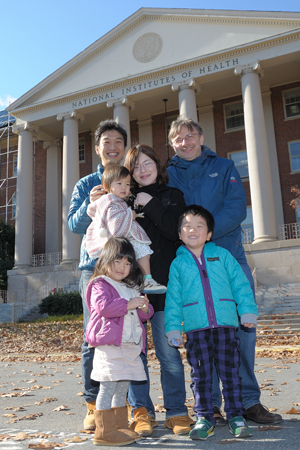 Dr. Wataru Sakamoto had just placed a tube in the abdomen of his patient when the operating room started shaking. For six minutes on March 11, 2011, he and another doctor in a hospital in Koriyama, Japan, held the patient, keeping him from falling off the table.
Dr. Wataru Sakamoto had just placed a tube in the abdomen of his patient when the operating room started shaking. For six minutes on March 11, 2011, he and another doctor in a hospital in Koriyama, Japan, held the patient, keeping him from falling off the table.
When the shaking paused and the patient stabilized, Sakamoto found the aftershocks – both literal and emotional – were about to begin. He worked through the night as ambulances streamed to the hospital, then ran home to check on his family, including his wife, Rie, and three young children.
“My son was crying because the aftershocks continued,” Sakamoto said. Possessions were falling and the water supply had stopped. His youngest daughter, Hinami, was only an infant.
That daughter is more than a year old now. In November, she and her older brother and sister, Kodai and Risora, tumbled around the leaf-strewn grass outside the NIH’s Building 1 while Sakamoto talked about the catastrophic events that led to his happy landing in an NIDDK lab.
After the earthquake, the Fukushima Daiichi nuclear facility began failing, leaking radiation into the environment, including where the Sakamotos lived, about 35 miles away. “Many people in Fukushima are now suffering from radioactivity,” Sakamoto said.
Meanwhile in Bethesda, the NIH’s Japanese Scientists Association (NJSA) – a volunteer group of Japanese researchers from the NIH and FDA – looked for ways to provide long-term help. The organization began reaching out to scientists in Japan to offer assistance through temporary positions at the NIH.
Along with his hospital position, Sakamoto, who has an M.D. and a Ph.D., is a member of the Fukushima Medical University Department of Surgery. Through a colleague at NIH, Sakamoto heard of the NJSA’s initiative. A few years earlier, he and his boss at the university had talked about Sakamoto doing a research stint abroad. The timing hadn’t work then, but it did now. Sakamoto offered to take part in the NIH program, and in October he and the family arrived in Bethesda. Sakamoto is the first Japanese researcher to come to the NIH for a long-term visit under an NJSA arrangement.
For two years, the first funded by Fukushima Medical University, Sakamoto will conduct research in the laboratory of Dr. Jürgen Wess, chief of the Molecular Signaling Section in the NIDDK’s Laboratory of Bioorganic Chemistry. Together, they’ll be working to find strategies to modulate the activity of certain cell surface receptors for potential therapies for diseases such as diabetes and obesity.
“Based on his clinical background, Wataru was very interested in our line of work,” said Wess. “He’s enthusiastic and very serious about his research. He clearly wants to achieve something.”
Sakamoto hopes those achievements will include at least one major research paper and perhaps even a lecture in English.
Along with the excitement of doing research, Sakamoto is happy to be protecting his family’s health. In Fukushima, radiation had led to rules like one restricting the time children can play outside. Now, when Sakamoto watches his children run through the leaves, it is momentous.
New NIH clinical trial website launched for public, health care providers
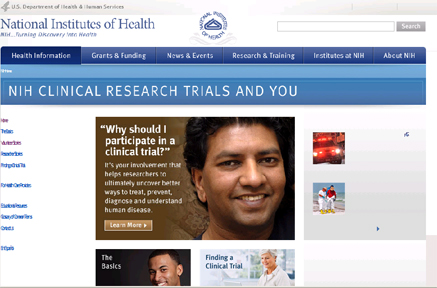
The NIH has a new website, NIH Clinical Research Trials and You, to help people learn more about clinical trials, why they matter, and how to participate. From the first cure of a solid tumor with chemotherapy to the use of nitroglycerin for heart attacks, clinical research trials — or research studies involving people — have played a vital role in improving health and quality of life for people around the globe.
Clinical trials are essential for identifying and understanding ways to prevent, diagnose, and treat disease. Research has shown that among the greatest challenges to recruitment of volunteers is the lack of general knowledge about what trials involve, where they are carried out, and who may participate.
"The ability to recruit the necessary number of volunteers is vital to carrying out clinical research that leads to health and medical advances," said NIH Director Francis S. Collins, M.D., Ph.D. "This new, centralized resource will make it much easier for the public and health professionals to learn about clinical trials and how people can participate in them."
The website is at www.nih.gov/health/clinicaltrials/.
KUH initiative seeks community-level solutions for treating CKD
By Anne Wright
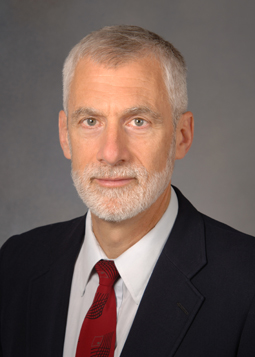 The NIDDK’s Division of Kidney, Urologic, and Hematologic Diseases (KUH) is breaking new ground by funding an initiative to translate chronic kidney disease (CKD) research into routine clinical practices to reduce the disease.
The NIDDK’s Division of Kidney, Urologic, and Hematologic Diseases (KUH) is breaking new ground by funding an initiative to translate chronic kidney disease (CKD) research into routine clinical practices to reduce the disease.
Under the initiative, five projects are testing the effectiveness of approaches that are highly likely to be adopted and sustained in a wide range of health care settings and by individuals and communities at highest risk for CKD. Projects selected for funding had to demonstrate that their approaches would not require extraordinary new or additional resources and could be adapted to settings with limited resources where high-risk communities are served, such as community health centers.
“We have interventions which have been proven to prevent or delay the development of CKD,” said Andrew Narva, M.D. (pictured left), who oversees the grants and directs the National Kidney Disease Education Program (NKDEP). “Unfortunately, we have not been successful in implementing these proven therapies in the community. We need to test new approaches.”
CKD, a condition in which the kidneys gradually lose function, affects an estimated 23 million American adults. Diabetes and high blood pressure are the most common causes of CKD. The projects, which began last fall and will continue through 2016, are studying several ways to improve care for patients with CKD, including the use of health information technology such as enhanced electronic health records and patient registries; techniques to help patients manage their own care; and educational materials and resources for patients and health care providers.
“Currently, there is a major translation gap between CKD research and practice, resulting in poorer health outcomes and higher mortality,” said Narva. “We need to figure out how to deliver appropriate care to those who need it. We hope to use the knowledge gained from this research to inform the work of NKDEP.”
To learn more, contact Narva at narvaa@mail.nih.gov.
NIH collaborates on HBO documentary series on obesity
Working with HBO and major health organizations to address the national problem of obesity, NIH will be helping launch "The Weight of the Nation," a documentary series and public education initiative that spotlights the facts and myths of this urgent public health issue, showing how obesity affects the country’s health.
The project comprises four documentary films, an HBO Family series, 14 short films, a social media campaign, a book and a nationwide community-based outreach campaign. The films are produced by HBO Documentary Films and the Institute of Medicine, in association with NIH and the Centers for Disease Control, and in partnership with the Michael & Susan Dell Foundation and Kaiser Permanente.
“If we don’t succeed in turning this epidemic around, we are going to face, for the first time in our history, a situation where our children are going to live shorter lives than we do,” said NIH Director Dr. Francis S. Collins, who features prominently in the films, along with NIH investigators and grantees from NIDDK and other NIH components. Off-camera, the senior leadership group of the NIH Obesity Research Task Force – including NIDDK’s Drs. Susan Yanovski and Philip Smith – provided research expertise to the scientific content of the production.
On May 14, two films will examine the scope of the obesity epidemic and its health consequences as well as discuss what science has shown about how to lose weight, maintain weight loss and prevent weight gain. On May 15, two films will examine the effect of obesity on the nation’s children and the major environmental forces behind the rise in obesity. On May 16, the first in a series of films called “The Weight of the Nation for Kids” will air on HBO Family. The films will stream on HBO.com for free and may be provided for free by some cable carriers.
To facilitate community action, kits will be distributed to several thousand community-based organizations working on obesity prevention in late April. The kits will include the series as well as discussion guides in English and Spanish.
For more information, go to http://theweightofthenation.hbo.com/ .
.
KUH conferences advance understanding, approaches to fields
 In February, NIDDK’s Division of Kidney, Urologic, and Hematologic Diseases held the “NIDDK KUH Winter Conferences 2012,” a series of workshops on topics including kidney genetics, hematopoiesis, kidney morphology, and nonmalignant hematology. The workshops served many goals:
In February, NIDDK’s Division of Kidney, Urologic, and Hematologic Diseases held the “NIDDK KUH Winter Conferences 2012,” a series of workshops on topics including kidney genetics, hematopoiesis, kidney morphology, and nonmalignant hematology. The workshops served many goals:
On Feb. 11 and 12, the first conference of the group, “Whole Genome Approaches to Complex Kidney Diseases,” met in Bethesda, Md., to address questions such as how to help the nephrology research community make use of next-generation sequencing capability that have made whole exome studies – studies that use an approach that decodes the 1-2 percent of the genome that contains protein-coding genes – accessible for clinical research.
The conference convened to evaluate study designs and existing DNA repositories and databases that are relevant to whole exome studies; to learn about emerging statistical approaches to effectively evaluate and analyze the myriad variants identified in whole exome studies; to consider the optimal ways to perform whole exome research, in terms of ethical, legal, and social aspects; and to discuss how best to transmit complicated findings to patients when these whole exome approaches become a routine part of clinical nephrology practice.
“Whole exome testing is already being marketed to consumers and will likely be a part of routine clinical practice, at least when addressing particular clinical problems, within the next decade,” said NIDDK intramural researcher Dr. Jeffrey Kopp, co-chair of the conference. “This will require physicians who see kidney patients to help their patients understand such concepts as carrier status, recessive genes, susceptibility alleles, and clinical risk estimates. Physicians will often require additional training in genetic medicine and access to NIH databases that provide current information on the clinical implications of particular genetic variants.”
On Feb. 13-14, despite vigorous competition from Valentine’s Day observances, NIDDK held a conference, “Quantitative Morphology in Kidney Research,” to review techniques to count the number of glomeruli and podocytes in kidneys. There is evidence that glomerular endowment is affected by genetic factors and by environmental exposures during gestation, and that low glomerular numbers are associated with an increased risk for chronic kidney disease in adulthood. Speakers discussed stereology, a set of techniques used to estimate features of three-dimensional objects from lower-dimensional samples, and considered stereologically valid approaches to assessing kidney samples from humans and experimental animals.
“Stereology offers a sophisticated suite of methods to count and measure objects,” said Kopp, the event’s co-chair. “These methods can be applied to research material ranging from whole organs to a few tissue sections. It is critical that researchers select the most appropriate method for their purpose and their material, as only stereologically sound techniques will produce valid data and lead to sound conclusions.”
On Feb. 20, the NIDDK held a “state of the science” workshop, “Regulatory Determinants of Hematopoietic Stem Cell Self-Renewal, Lineage Commitment and Terminal Differentiation: New Insights.” The workshop’s objectives were to provide an opportunity for research leaders in the field of hematopoietic stem cell (HSC) biology to examine current understanding of how HSC self-renewal, lineage commitment, and terminal differentiation are regulated; to define knowledge gaps and key unanswered questions in these critical aspects of HSC biology; and to define opportunities, directions, and priorities for future research to address these questions.
NIDDK Senior Scientific Advisor and Program Director for Hematology Research Dr. Daniel Wright, principal organizer of the workshop, was pleased with the capacity attendance of more than 140 researchers from around the country and Canada , reflecting a high level of interest in the workshop’s focus and objectives.
On Feb. 23 and 24, NIDDK’s Nonmalignant Hematology Research Network, or HEME-NET, held a meeting in Rockville, Md. The workshop marked the first time this group of NIDDK hematology grantees had met face-to-face to share research activities, build relationships between researchers in the field of NIDDK hematology interests, learn about NIDDK-funded resources available through the Centers of Excellence in Molecular Hematology, and assemble a prototype for the network.
“The meeting was enthusiastically attended by investigators, who overwhelmingly supported the notion of building a network to facilitate communication and collaboration among members and to inform the community at large about research accomplishments in nonmalignant hematology,” said NIDDK Hematology Program Director Dr. Terry Bishop. “Attendees felt that HEME-NET could leverage and strengthen the field by fostering the exchange of ideas and by posting collaborative opportunities and available resources.”
NIDDK workshops will continue through the spring. On April 17, experts will convene to discuss “Glomerular Disease: Pathophysiology, Biomarkers, and Registries for Facilitating Translational Research.” Goals addressing glomerular disease include discussing mechanisms that initiate and drive progression of glomerular diseases to end- stage kidney disease; exploring targets and pathways to therapeutic development; assessing existing biomarkers that define diagnosis, initiation, progression, and relapse; and discussing approaches to potential cooperation with industry, academia, government, and others. International experts from industry and academia as well as representatives from the NIH, FDA, and private foundations will discuss the challenges and pitfalls of glomerular disease research and formulate the path forward.
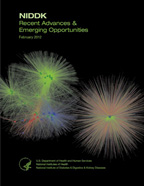
The NIDDK annual scientific report, NIDDK Recent Advances & Emerging Opportunities, is now available. This report highlights examples of NIDDK-supported research advances published in fiscal year 2011. It also includes stories of discovery, which trace research progress in specific areas over a longer time frame; profiles of patients who are benefiting from NIDDK-supported clinical research; and highlights scientific presentations made to the NIDDK Advisory Council during 2011. This year’s report includes information on the cutting-edge NIDDK-supported research being conducted on the microbiome – the collection of microorganisms that reside in and on the human body, including the digestive tract. These microbes can influence a range of physiological traits, diseases and conditions.
To read the report, go online to www.niddk.nih.gov. Or request a hard copy via the message box at http://catalog.niddk.nih.gov/ContactUs.cfm, by calling 1-800–860–8747 between 8:30 a.m. and 5 p.m. ET Monday through Friday, or by writing to NIDDK Clearinghouses Publications Catalog, 5 Information Way, Bethesda, MD 20892–3568.

Kidney Sundays spread kidney health and diabetes prevention message
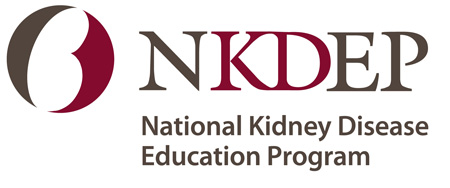 The National Kidney Disease Education Program (NKDEP) has teamed up with the American Diabetes Association, National Coalition of Pastors’ Spouses, and Chi Eta Phi Sorority to raise awareness of kidney health and diabetes prevention during National Kidney Month in March.
The National Kidney Disease Education Program (NKDEP) has teamed up with the American Diabetes Association, National Coalition of Pastors’ Spouses, and Chi Eta Phi Sorority to raise awareness of kidney health and diabetes prevention during National Kidney Month in March.
At the center of the awareness effort is an inaugural Kidney Sundays event March 25, when faith leaders of over 50 mostly African American congregations will hold kidney education sessions, offer health screenings, and distribute educational materials. Kidney health and diabetes prevention messages from NKDEP and its partners will follow throughout the week. Messages in these communities will emphasize the connection between diabetes and kidney disease and the importance of testing, as African Americans are disproportionately affected by these diseases.
The Kidney Sundays initiative will use traditional and social media to share health and prevention messages, including a national radio media tour with NIDDK Director Dr. Griffin P. Rodgers on March 21, Healthy Moments radio features (@healthymoments on Twitter), and Facebook posts at www.facebook.com/MaketheKidneyConnection. Online information, including a Kidney Sundays toolkit, is available at www.nkdep.nih.gov.
“By partnering with these national grassroots organizations on the Kidney Sundays program, NKDEP is able to directly connect to the faith community with actionable, science-based health messages for those most at risk for kidney disease,” said NKDEP Director Dr. Andrew Narva.
To learn the “Top 10 things you can do to prepare for National Kidney Month,” visit the NKDEP website at http://nkdep.nih.gov/kidneymonth/.
NDEP welcomes new leadership
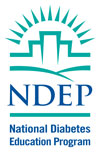
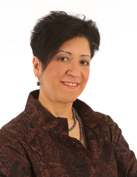 The National Diabetes Education Program (www.YourDiabetesInfo.org) is honored to welcome Dr. John Buse as the program’s new chair and Wanda Montalvo as NDEP’s new Operations Committee chair. They will serve in these roles for two-year terms.
The National Diabetes Education Program (www.YourDiabetesInfo.org) is honored to welcome Dr. John Buse as the program’s new chair and Wanda Montalvo as NDEP’s new Operations Committee chair. They will serve in these roles for two-year terms.
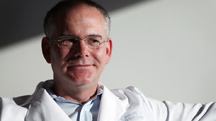 Buse’s leadership role with the NDEP builds on notable accomplishments spanning more than 25 years. Buse, who has an M.D. and Ph.D., is currently a medical professor at the University of North Carolina in Chapel Hill, where he serves as director of the Diabetes Care Center, chief of the Division of Endocrinology and executive associate dean for clinical research. He also works within the leadership of the North Carolina Translational and Clinical Sciences Institute, home of the UNC NIH Clinical and Translational Science Awards.
Buse’s leadership role with the NDEP builds on notable accomplishments spanning more than 25 years. Buse, who has an M.D. and Ph.D., is currently a medical professor at the University of North Carolina in Chapel Hill, where he serves as director of the Diabetes Care Center, chief of the Division of Endocrinology and executive associate dean for clinical research. He also works within the leadership of the North Carolina Translational and Clinical Sciences Institute, home of the UNC NIH Clinical and Translational Science Awards.
Buse has played key roles in many multicenter clinical trials, including two major NIH-sponsored trials: Action to Control Cardiovascular Risk in Diabetes, for which he serves as study vice-chair, and Studies to Treat or Prevent Pediatric Type 2 Diabetes. He served as 2008 president, medicine and science, of the American Diabetes Association, for which he has also chaired many committees and task forces.
Montalvo, an R.N., M.S.N., and A.N.P., is an executive nurse leader and a longtime, active partner in NDEP activities. Montalvo was the clinical director for the New York State Diabetes Campaign, sponsored by NYSHealth Foundation, where she expanded clinical and community partnerships and supported statewide diabetes training using NDEP’s Road to Health Toolkit.
Prior to joining NYSHealth, she was the chief clinical program officer at the Community Health Care Association of New York State. She is a recipient of the Healthy Youth for a Health Future Champion Award from the U.S. Surgeon General, the Quality Center of the Bureau of Primary Health Care Outstanding Achievement Award, and a Robert Wood Johnson Foundation Executive Nurse Fellow 2004–2007, as well as a National Advisory Committee member for Partners Investing in Nursing.
Planning and Grant Resources
NIDDK funding opportunities and deadlines:
www2.niddk.nih.gov/Funding/FundingOpportunities/
Grants and Contract Notices:
www2.niddk.nih.gov/Funding/FundingOpportunities/Notices

Congratulations
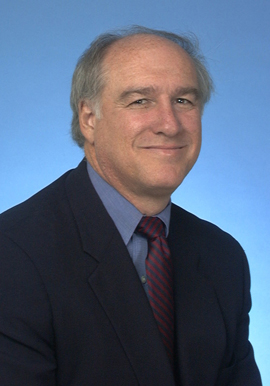 |
NIDDK grantee Dr. Myron S. Cohen led an NIH HIV Prevention Trials Network study that the journal Science named the 2011 Breakthrough of the Year. The study offered proof that antiretroviral treatment prevents the sexual transmission of HIV-1. Cohen, the J. Herbert Bate Distinguished Professor of Medicine, Microbiology and Immunology and Public Health at the University of North Carolina at Chapel Hill, has received more than 20 years of continuous NIH funding, including NIDDK funding for basic science research earlier in his career and an NIH MERIT Award in 2005. Read more at: www.nih.gov/news/health/dec2011/niaid-22.htm.
|
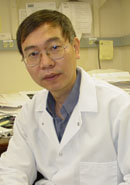 |
Dr. Chuxia Deng, chief of the Mammalian Genetics Section in the NIDDK Genetics of Development and Disease Branch, was named a fellow of the American Association for the Advancement of Science for his distinguished contributions to the field of mammalian development and genetics, particularly toward the functions of BRCA1, FGF receptors, SMAD proteins, and SIRTUINs.
|
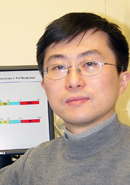 |
Dr. Kai Ge, chief of the Adipocyte Biology and Gene Regulation Section of NIDDK’s Laboratory of Endocrinology and Receptor Biology, was granted tenure by the NIH Central Tenure Committee.
|
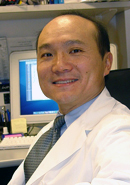 |
Dr. Jake Liang, chief of the NIDDK Liver Diseases Branch, was awarded a 2012 grant for Regenerative Medicine as part of an NIH Common Fund initiative to conduct pilot projects to advance clinical applications of induced pluripotent stem cells (iPSCs). The Liang lab was awarded the grant for the project “iPSC-derived Human Hepatocytes: A Model for Treatment of Liver Disease.” NIDDK intramural researchers were awarded two of six Regenerative Medicine grants given through the NIH Common Fund.
|
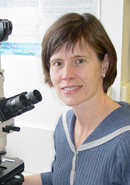 |
Dr. Caroline Philpott, chief of the Genetics and Metabolism Section of the NIDDK Liver Diseases Branch, was named a fellow of the American Association for the Advancement of Science for her distinguished contributions to the field of metals in biology, including her elegant dissection of mechanisms by which iron is acquired, distributed, utilized and regulated.
|
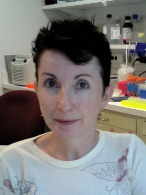 |
Dr. Karen Usdin, chief of the Gene Structure and Disease Section in the NIDDK Laboratory of Cell and Molecular Biology, was awarded a 2012 grant for Regenerative Medicine as part of an NIH Common Fund initiative to conduct pilot projects to advance clinical applications of induced pluripotent stem cells (iPSCs). The Usdin lab was awarded the grant to develop Induced Pluripotent Stem Cells (iPSCs) from individuals with Fragile X Syndrome for modeling disease pathology and for drug screening. NIDDK staff scientist Dr. Daman Kumari was instrumental in developing the project. NIDDK intramural researchers were awarded two of six Regenerative Medicine grants given through the NIH Common Fund.
|
Welcome
 |
Camille Hoover, M.S.W., was named executive officer of NIDDK in January 2012. She came to NIDDK from the NIH’s National Center for Complementary and Alternative Medicine (NCCAM), where she served as executive officer since 2000. Partnering with the director, she helped create the research enterprise from the ground up. Prior to that position, Hoover had been a social worker for the National Cancer Institute (NCI), administrative officer for NCI's Surgery Branch, and manager of one of NCI's largest Administrative Resource Centers. Hoover is a member of several key NIH-wide corporate committees and has received awards including the NIH and NCCAM Directors’ Awards, NIH Merit Awards and the NIH Quality of Work Life Award.
|
Four new members recently joined NIDDK’s advisory council:
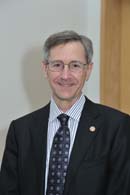 |
Dr. Kenneth Kaushansky serves on the Division of Kidney, Urologic, and Hematologic Diseases Subcouncil. He is dean of the School of Medicine and senior vice president of Health Sciences at Stony Brook University. He has conducted seminal research on the molecular biology of blood cell production, and his team has cloned several genes important in the growth and differentiation of blood cells, including thrombopoietin, a key regulator of cell and platelet production. |
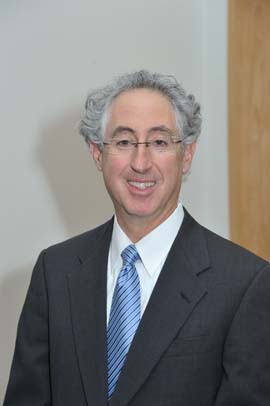
|
Dr. Alan Shuldiner serves on the Division of Diabetes, Endocrinology, and Metabolic Diseases Subcouncil. He is the John Whitehurst Professor of Medicine; associate dean for Personalized Medicine, director of the Program for Personalized Medicine, and head of the Division of Endocrinology, Diabetes and Nutrition at the University of Maryland School of Medicine. His research interests include the molecular basis and genetics of type 2 diabetes, obesity, and insulin resistance.
|
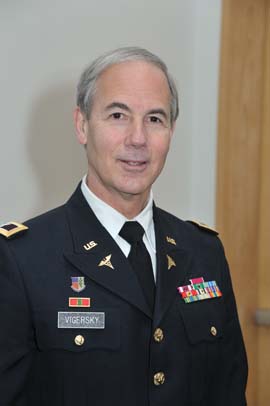 |
Dr. Robert Vigersky serves on the Division of Diabetes, Endocrinology, and Metabolic Diseases Subcouncil. He is a colonel in the Medical Corps at Walter Reed Army Medical Center, medical director of the Diabetes Institute of the Walter Reed Health Care System, and a professor in the Department of Medicine of the Uniformed Services University of the Health Sciences. Vigersky has produced articles and book chapters on topics ranging from reproductive endocrinology and diabetes management to telemedicine and e-health. He is serving as the Department of Defense Ex Officio member of the NIDDK council.
|
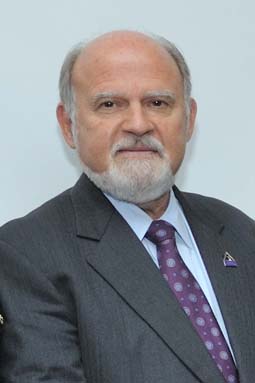 |
John W. Walsh serves on the Division of Digestive Diseases and Nutrition Subcouncil as a public member. Diagnosed with Alpha-1 Antitrypsin Deficiency in 1989, he co-founded the Alpha-1 Foundation to provide leadership and resources to improve detection and treatment, and to find a cure, for Alpha-1. He regularly testifies before Congress and advisory groups as a patient advocate and served three terms on the Health and Human Services Advisory Committee on Blood Safety and Availability, among many other positions. |
In Memoriam
|
Dr. Wylie Vale, a longtime NIDDK grantee and former NIDDK council member, died in January. He was a Salk Institute professor and world-renowned expert on peptide hormones and growth factors that provide communication between the brain and endocrine and immune systems. Research from Dr. Vale’s lab led to new methods for the diagnosis of pituitary disease and opened new possibilities for the development of drugs to treat anxiety, depression, irritable bowel syndrome and drug abuse. He was also former president of both the American Endocrine Society and the International Society of Endocrinology. |
The next edition of the Director’s Update will be online at www.directorsupdate.niddk.nih.gov in May.
Submission information: The Director’s Update is published in March, May, September, and December. To submit an item for the next Update, please contact Editor Amy F. Reiter at reiteraf@niddk.nih.gov. Items must be submitted six weeks before the month of publication to be considered for the next issue.
Subscription information: The NIDDK Director’s Update is published four times a year. To subscribe to the Update, go to www.directorsupdate.niddk.nih.gov. The subscription box is near the top right of the page.
Page last updated: March 20, 2012